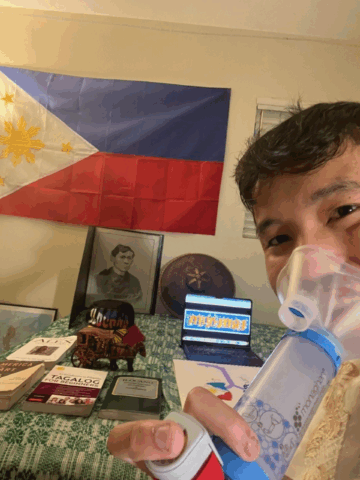The emotional stages of dealing with a child’s cancer diagnosis
A child’s cancer diagnosis can be traumatic for the whole family — kids, siblings and parents alike. As families process the news and start treatment, they may understandably deal with all sorts of challenging emotions like shock, anxiety and grief.
Here, Dr. Tiffany Torigoe-Lai, a pediatric psychologist at CHOC, answers questions that parents might have about how to help themselves, their child and their child’s siblings cope with a cancer diagnosis.
What are some typical reactions from families with a member who receives a cancer diagnosis?
Although all families are different, many will have challenging emotions following a cancer diagnosis, including:
Shock
Receiving a cancer diagnosis is often shocking. For some families, a routine doctor’s appointment leads to a cancer diagnosis. For some, it may feel like their family just did a 180 — their child was generally healthy, and now they are sick.
This may cause some parents to have a wariness about the whole situation. They might not believe that what the doctors are saying is true, because they just want to know what is going to happen to their child, and why this is happening at all.
Anxiety
Once the initial shock wears off, it might lead to sadness, anxiety and worry about the diagnosis. Parents and their children may think, What does this mean for us now? What is going to happen?
Guilt
Some parents may feel guilty. Common thoughts that come up are often, What did I miss? What did I not catch?
Grief
Many families go through a grief process following a cancer diagnosis, says Dr. Torigoe-Lai.
Families may grieve different things. Maybe they’re grieving the life their child might miss out on or the developmental trajectory of what they hoped for their child.
Parents of adolescents and young adults may grieve their parent-child relationship. An adolescent or young adult may have more autonomy at the time of the diagnosis, with their parent assuming a more independent parenting role as well. But suddenly, the parent may return to being highly involved in their child’s life and being around all the time, which may drastically change the dynamic of that relationship.
Historically, grief has been believed to happen in stages. Usually, these stages are explained to happen in chronological order —denial, anger, bargaining, depression and acceptance. You experience one stage and then the next until they are finished and you accept what’s happened.
However, more current research shows that grief is not linear — it waxes and wanes, says Dr. Torigoe-Lai. Grief is more like a river — there are ebbs and flows with waterfalls and rapids.
It’s important for families to understand that grief can show up at all different times during treatment. The stages of grief model may add pressure to families who are experiencing grief – like they shouldn’t feel a certain stage because they are supposed to be passed that, or they can’t feel grief after accepting the diagnosis. It’s totally understandable and normal to be grieving this experience for months or years, and hence why grief is NOT a linear process.
My child just received a cancer diagnosis. What do I do first?
My advice for parents who just received a cancer diagnosis for their child is to first give yourself a moment and figure out the best way to proceed, says Dr. Torigoe-Lai. Everyone might have an opinion of what you should do first, but you know yourself best. Maybe it helps you to immediately plan and problem solve, or maybe you need a minute to step back and process.
And once you have a minute to process, you might want to dive in and learn as much about your child’s illness as you can. But you should know that you don’t have to do it alone. There is a great support in the hospital — nurses, doctors, and a robust psychosocial team, including social work, psychology, child life, music therapists, art therapists, spiritual care and pet therapy.
Don’t be afraid to keep asking the same questions — all the information can be intense, overwhelming and new, and it may take time and repetition to grasp it.
My child has cancer. How do I cope?
It’s OK to give yourself time.
If you need a break, take a break. If you need a 10-minute walk, go take that 10-minute walk. Because as a parent, you need to be refreshed and take care of yourself so you can take care of your child.
Parent support groups are also helpful, whether it’s locally or even nationally.
Say yes to helpful gestures.
Don’t be afraid to say yes when people ask, “Can I help?”
If you’re going to cash in a favor from someone, now is the time. Your friends and family want to help you!
So don’t leave their offers to help as empty gestures. Say yes, and defer some of the things that people can do for you. They can pick up groceries for you or take your dog on a walk — they can do the little things that might feel overwhelming right now.
It’s OK to say no to overwhelming requests.
In the same vein as saying yes to help, parents should also know that it’s also OK to say no to anything that’s too emotionally taxing.
So many things are going on in life, and normally you would be able to be there for your family and friends as they go through different challenges. But during this time, it may be overwhelming to talk on the phone with your friend who is complaining about work. And that’s OK — it’s OK to tell them that you love them but can’t talk right now.
Access financial resources.
The financial burden of cancer treatment can be a big concern for parents, and financial stress can have a negative impact on their ability to cope with the diagnosis.
It’s important to lean on your support staff from the hospital for this. They can walk you through your health insurance benefits and your financial aid options. The staff can help you relieve some financial stress so you can take better care of yourself and your child.
Look for red flags.
As mentioned before, the grief process can ebb and flow, but it’s important to keep an eye out for red flags.
Some parents might be so consumed by grief that they can’t do the things that they typically do without problems, such as problem solving or grocery shopping. Some might not want to talk to anyone about their feelings and they may start to isolate themselves from others.
After a few weeks or a month, if you feel not like yourself and the things that you once enjoyed aren’t bringing you joy anymore — you might need to seek some extra help from a mental health provider.
How can I help my child cope with their cancer diagnosis?
Coping with a cancer diagnosis can be difficult and take some time. However, there are some things that parents might be able to do to ease some pain and anxiety during the coping process. Dr. Torigoe-Lai suggests:
Talk to your child about their cancer.
The biggest piece of advice that I usually give parents is to talk to their kids about their cancer diagnosis and treatment at a developmentally appropriate level, says Dr. Torigoe-Lai. It can be scary, vulnerable and painful to talk about a child’s cancer diagnosis; a lot of times people don’t even want to say the word cancer. Hospitals like CHOC have a robust psychosocial and medical team that can help with how best to explain what cancer is and how it’s affecting their child.
By talking about cancer, how your child feels and what’s happening in their treatment, it can normalize it; it can make it less scary for them.
Acknowledge the uncertainty.
Most survivors and families live with some level of uncertainty from the moment they’re diagnosed to when active treatment ends. Even after active treatment is finished, there may be still a lot of uncertainty about what the future might hold.
It can be helpful for your family to acknowledge the uncertainty and know that it’s very normal. Even adult survivors of pediatric cancer say that routine blood draws make them think about relapse or recurrence. And it’s OK to feel that way — acknowledging that it’s there with family and friends can make it feel less scary and isolating.
Don’t promise your child that they won’t have to do hard things.
Especially for younger kids, it’s important for parents to provide comfort and care during treatment without making promises that can’t be fulfilled.
For example, parents should avoid telling their kids that part of their treatment isn’t going to hurt if there is a possibility it will. You should refrain from telling your child that they’ll never have to have this treatment again or go through this hard thing. It can break their trust in you.
Instead, you can tell your child that something might hurt or be hard, but it’s temporary and you will be there with them through each step. That way, your child can start to develop resiliency to face those challenges in the future.
Bring comfort items to the hospital and offer comforting touches.
If your family is coming to stay at the hospital for treatment, bring items like toys, blankets and familiar items from home that can give your child a sense of comfort.
Also, your love and care is one of the strongest tools to help your child when they are going through a cancer diagnosis or treatment. Hugs or comforting touches like backrubs can be helpful. Some parents may feel like they are babying their child too much and need them to be tough, but no matter if you are 4 or 20 years old, comfort from your parents when you’re sick always feels good.
Stick to a routine.
You may be scared to hold your child to a certain standard because they’re sick and don’t want to upset them.
However, the goal is for your child to heal and survive. Kids thrive off routines because they want to know what to expect, which helps lower anxiety. Establishing a routine — whether at home or at the hospital — can be beneficial for your child’s physical and mental health.
What do I do if my child doesn’t understand their diagnosis?
Most children’s hospitals have child life specialists that are trained and well-versed in providing education across the developmental ranges for children, parents and siblings alike. They can help your child understand their diagnosis and what it may mean for them moving forward.
Books are also a great resource for helping kids understand their diagnosis. They may help both children and parents digest the information about their diagnosis and prompt conversations about what’s going on with their bodies and why this happened.
View book recommendations for kids and parents from CHOC’s child life department.
What are some coping techniques for my other kids whose sibling has cancer?
Sometimes, siblings can be a bit forgotten about because the focus is so much on their sibling with cancer. It’s no fault of anyone in the family — there is a lot happening, and it’s totally understandable that attentions are divided. Dr. Torigoe-Lai suggests the following ways that parents can support their other children while their sibling has cancer:
Have them join a sibling support group.
Sometimes siblings might act like they are doing fine because they don’t want to burden their parents when they can see that they’re spending so much time caring for someone else. By joining a support group, either locally or nationally, siblings can talk to others who might be going through something similar. They can connect with kids their age and feel heard and understood.
Ask your friends and family to step in.
While caregivers or parents are understandably consumed with the high medical needs of their child with cancer, a friend or family member can serve as a point person for checking in on their other children.
Parents, lean on your friends and family to help. And when you can, don’t be afraid to ask your other children if there’s anything they need.
Spend 10 to 15 minutes of quality time with them.
When possible, try to take 10 or 15 minutes to spend with your other children, and let them guide play or the activity you’ll be doing together. Maybe you work on a puzzle with them, color a picture or watch a video together.
Some parents tend to feel guilty that they have been neglecting their other children and pressure themselves about doing something big for them. That’s not necessary — a small amount of quality time spent with them can go a long way.
What should my other kids say to their sibling with cancer?
If your child doesn’t know what to say to their sibling with cancer, I would encourage them to be curious, says Dr. Torigoe-Lai.
Just like parents, siblings don’t need to shy away from saying the word “cancer.” Instead, they can ask their sibling questions like: “What is it like in the hospital?” “How have you been feeling?”
I’ve learned so much from my patients about this, Dr. Torigoe-Lai says. Many kids say that they feel people don’t seem to understand what they are going through, but many times friends or family members don’t ask questions about their experiences either.
Naturally, people tend to shy away from asking questions about things that are difficult. But family and friends should ask the child with cancer to let them know when a question might be too much, instead of shying away from asking questions in the first place.
Some kids feel like they are burdening their families by having cancer. By giving the child the space to talk about their treatment, how they are feeling or what they might be afraid of can make them feel less alone and less like a burden AND gives them permission to talk about it too!
Get mental health resources now.
Get more expert health advice delivered to your inbox monthly by subscribing to the KidsHealth newsletter here.

Learn more about the Hyundai Cancer Center at CHOC
CHOC Hospital was named one of the nation’s best children’s hospitals by U.S. News & World Report in its 2024-25 Best Children’s Hospitals rankings and ranked in the cancer specialty.





